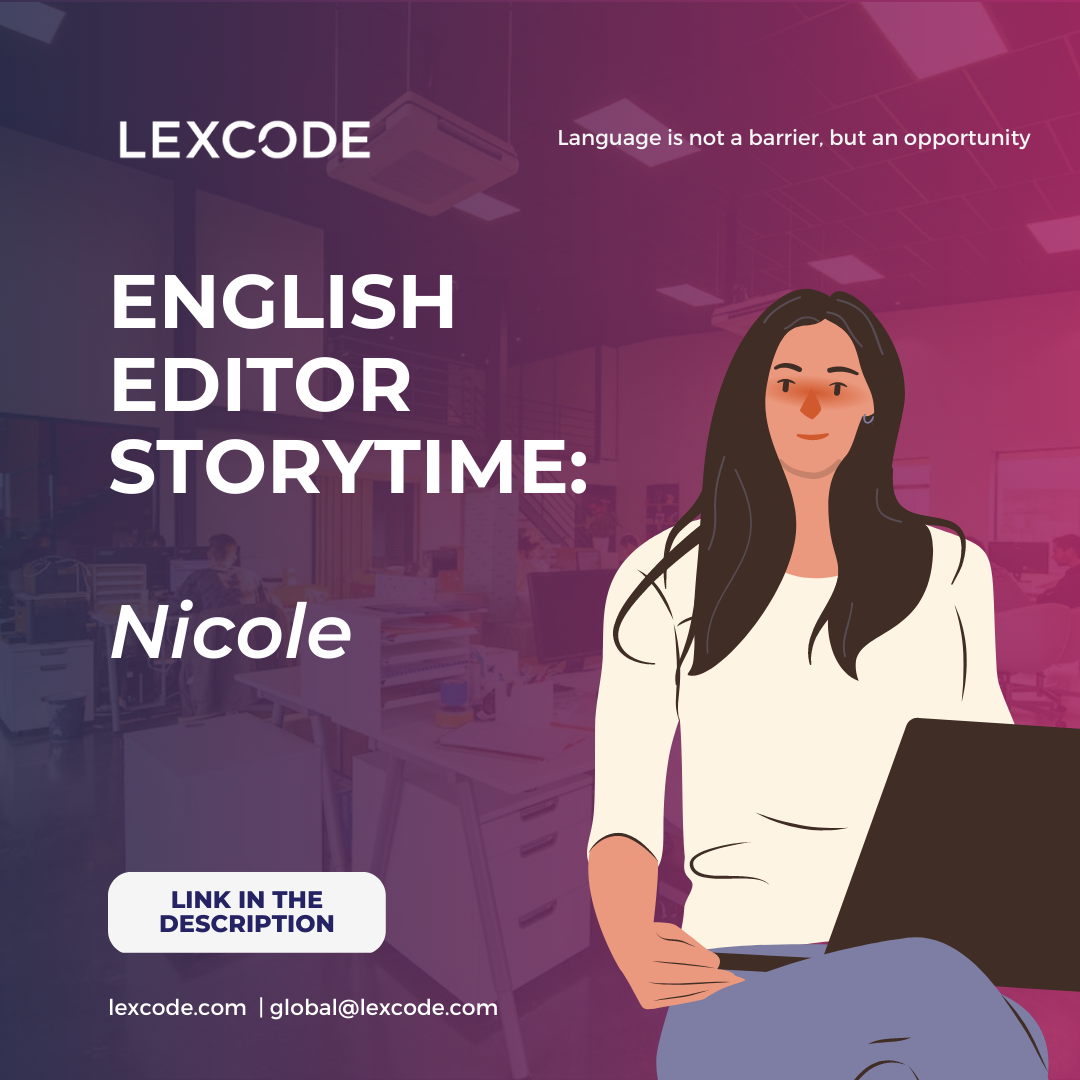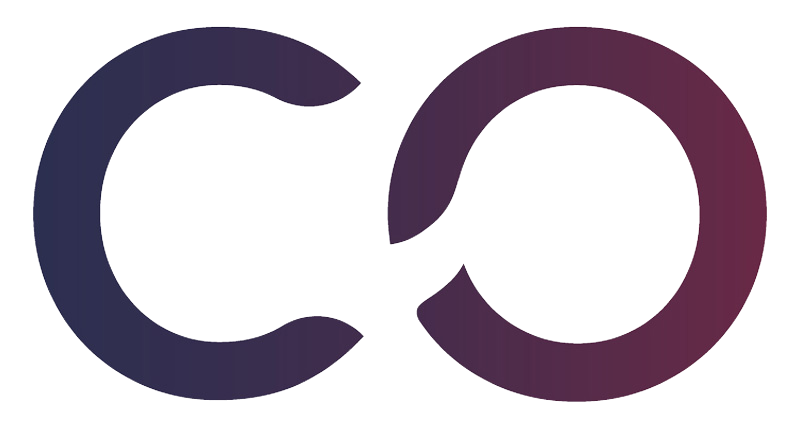This may be news to some of you, but localization doesn’t just involve translators. Editors play the key role of making sure the translated content is adapted to suit the cultural, social, and linguistic norms of your target audience. In Lexcode, our editors boast the highest flexibility in terms of the types of files that they can handle. From a Korean-to-English software manual to an inventive marketing campaign content for an organic shampoo, this variety is a daily reality for our editors.

In this article, we talked with Nicole, one of the team’s English editors, to chat about her insights on her profession, her own way of editing, and everything else in between. Let’s read her story below.
“Although I was academically trained to become a writer, I found that improving content is nearly as rewarding as creating it.”
Why did you want to be in the field of English editing?
I wouldn’t say I’ve always wanted to become an English editor, but now that I’ve been one for two years, I guess I’d know what makes the job desirable. As a language nut, every new file I’m assigned is an exciting opportunity to challenge my knowledge of grammar and such. Although I was academically trained to become a writer, I found that improving content is nearly as rewarding as creating it. If you feel stuck in a rut many a time, a great way to rekindle your love of writing, aside from reading or keeping to a writing schedule, is to edit—reading a piece of text and thinking, “I would’ve done it this way.” And learn a language, read the dictionary, and play word games—more on these later.
What kind of files do you enjoy editing?
The scope of files I could edit shrank ever since the company restructuring, and although I miss the frequent promotional and media files, I don’t mind the usual civil-government files I’m resigned to these days. I appreciate files of all stripes—manuscripts, copy, manuals, what have you. I’m up for any challenge.
What’s the English Editing team like?
Pre- or post-restructuring? Well, the editing team of yore was composed of different personalities, but we enjoyed being editors all the same. We grew close after going through major projects and challenges together. It was cool how we each had preferences in our work—for example, one had a penchant for legal files, and another one’s forte was media, given her background. Now, I’m teammates with only one person, and I enjoy how we learn different things from (and about) each other, from classical history to localizing jokes.
What effect does English editing have on the overall quality of your clients’ files?
I’d say English editing is indispensable to any project. There’s more to translating than just providing a word for a word until you make a sentence, and so on. Researchers don’t dare submit manuscripts for review without having them edited first. Copywriters sometimes need a second pair of eyes, especially if they’re advertising to a foreign market. Whether you want to check your grammar on a school paper or establish a corporation overseas, you’ll need an editor.
“I don’t like having errors spotted in my file, and not meeting a deadline is an error in itself.”
How do you personally ensure to meet the deadlines in your editing work?
I guess I’m deadline fearing; as someone self-critical (and who is a control freak at that), I don’t like having errors spotted in my file, and not meeting a deadline is an error in itself. Most of the time, we have a lot of legroom in the new team, and there are times I only work on as few as one file a day. But whenever my deadlines are stacked, I just make sure not to cram anything and start on a file as soon as possible. As I once quipped to my teammate, Monday’s rest is Tuesday’s test. I try to be as efficient as possible at work so that I wouldn’t have to work overtime unless necessary. For example, if, on the next day, I had a 10-pager due at 9:00 a.m. and multiple short files in the afternoon, I’d make sure to get ahead of the 10-pager but not spend any more seconds on the shorter files—I could comfortably start on those tomorrow once the long file is out of the way, as if they had just been assigned to me. It also helps that our large project deadlines are regular and our PMs are generous and practical with deadlines.
What is your editorial process after you receive a manuscript?
The nice thing about a manuscript is that you can edit it in parts, especially if you’re not up to the task of improving its jargon-filled language just yet. I don’t think I follow an order; it depends on my capacity to understand the manuscript from the get-go. I can begin with an editing run for mechanics, saving coherence and structure for later. I can cross-check references first, something requiring lower mental functions. If the subject matter is beyond my grasp, I can start off by reading the paper—even multiple times—to gauge its quality as well.
How do you continue improving your editing skillset?
I think there are no bounds to improving one’s editing skillset in the same way that there are no bounds to expanding one’s vocabulary or languages.
Lexcode has editing teams both in Korea and the Philippines. How do you ensure a collaborative environment between the two?
I couldn’t really give a timely answer, as I work with PH project managers, but back then, we used to resolve issues through frequent collaboration meetings. I’d say these proved effective for the most part, especially when it came to workload adjustments.
What is the most common error you see writers make?
I guess I’m not particularly fond of writers who resort to cliché by habit. Despite the plethora of words in the English language, many are not precise or intentional with their choice of words.
If you could give a two-sentence piece of advice to authors, what would it be?
Use words intentionally. There’s an equal level of skill in expanding and condensing ideas.
What is your favorite word and least favorite word?
Hmm … this is the type of question where answers come to you randomly, and I don’t happen to have a list. Off the top of my head, I like “burgeon,” “dearth,” and “parsimony.” But if I were to make a Wordle game, I bet not a lot could guess “dogma.” As for my least favorite word, I don’t think I have one, as I’m impartial to all words. But it is quite a pet peeve to hear “I could care less” (sorry, not a word per se). Though, I realized it exudes the same apathy as “I couldn’t care less” because it’s like you’re saying, “It’s possible I could care less [about this, if you spoke more about it].” Oh well.
What three books should all writers read?
I’m nowhere near as well-read as I’d like to be, and I’ve never picked up a single Harry Potter book. I am, however, a Lord of the Rings fan. I’ve only read The Fellowship of the Ring so far, but at the risk of sounding disingenuous, I’d recommend the entire trilogy. I admired Tolkien’s descriptive ability in the first book, which I’m sure also features in the other two. I learned so many nature words too! In any case, I’ll always believe in the Merriam-Webster Dictionary.

What are the biggest changes you’ve seen in the editing industry since you started?
I remember asking early on at work if translation as a profession would soon become obsolete, given that automatic engines like Google Translate were getting more widespread and sophisticated. I was told that, in our case, AI is used to enhance manual translation at most. But this was two years ago—now, we’re trying to ease into AI translation to eventually open this service to clients.
What do you like to do outside of work?
I enjoy listening to music, exercising, eating, and studying languages. I took to biking last year, and I’ve gone on a few long-distance trips this year. I’m happy I went from circling my driveway to riding from Quezon City (the part that’s a stone’s throw from Manila) to Marikina. Sometimes, I’d also play badminton after work if I could catch the sun. I’ve always enjoyed word games, too, and have recently incorporated them into my daily routine—The New York Times’s Wordle, Spelling Bee, Letter Boxed, and Mini Crossword, as well as Merriam-Webster’s suite of games, are a great way to start the day.
What advice would you give to someone who’s interested in working as a copy editor or English editor?
Practice being detail-oriented; you never know what error could be lurking in any length of text.

Finishing your own book or essay? We can help.
We at Lexcode put as much importance in editing as we do our bread and butter—localization. That should tell you how we ensure that every file we edit meets your requirements with an output that’s clear, concise, and free of errors. Email us at [email protected] or visit http://lexcode.com/ to learn more about our editing services.

